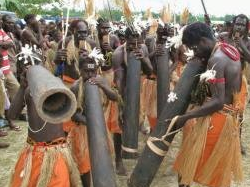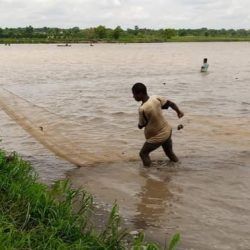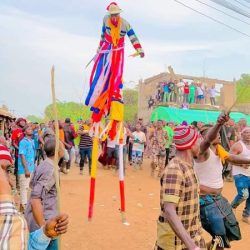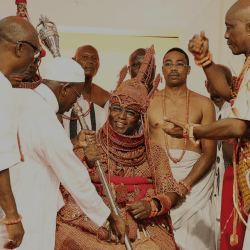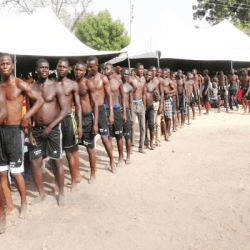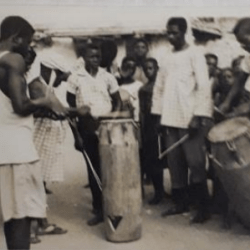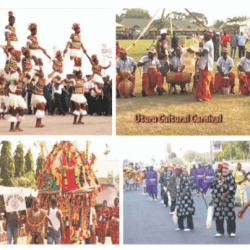The Iyeri Festival of the Ughelli people is a deeply rooted cultural and spiritual event that celebrates the legacy of Princess Irivwidide, a revered figure in Ughelli history. The festival, held annually in September, spans nine days and is marked by a series of rituals, dances, and communal activities that honor the ancestors and deities of the Ughelli clan. Below is a detailed overview of the origin and performance of the Iyeri Festival:
Origin of the Iyeri Festival
The festival traces its origins to Princess Irivwidide, a childless but highly respected and beloved figure in Ughelli. She was the chief priestess of the war deity Orevwo, which she invoked during battles to protect and guide her people. According to oral tradition, Princess Irivwidide was a fearless warrior who played a significant role in planning and participating in wars. She was never defeated in battle, largely due to the divine intervention of Orevwo, who would transform into a sacred deer (Orhea) to guide the Ughelli people during conflicts. The deer’s movements were interpreted as omens: crossing from right to left signaled victory, while crossing from left to right indicated defeat.
Before her death, Princess Irivwidide requested that an annual festival be held in her honor to immortalize her name. She specifically instructed that the festival include the washing of ancestral relics known as Ihenri, which are sacred objects made from the horns of large animals. These relics are kept by the eldest members of the main family groups and are central to the festival’s rituals.
Performance of the Iyeri Festival
The Iyeri Festival is a nine-day event filled with spiritual, cultural, and communal activities. Each day has its unique significance and rituals:
Day 1: General Dancing and Preparations
- The festival begins at dawn with communal dancing involving men, women, girls, and boys. This dance is a joyous celebration, though it excludes any sexually abominable acts.
- Animals are slaughtered, and there is an exchange of food and gifts among the people.
- Citizens pay homage to the Ovie (king) by presenting him with food and valuables.
- In the evening, the main event—the washing of the Ihenri relics—takes place. The relics are carried in a procession to the Echeode stream near Otovwodo, where they are sanctified by washing. Prayers for peace, prosperity, and good health are offered in the traditional manner.
- The day concludes with celebrants blowing horns and returning to a joyous crowd, followed by dancing until dusk.
Day 2: Worship of Orevwo and Ancestral Shrines
- The Ihenri relics are taken to the Orevwo shrine, where they are worshipped and served with pounded yam and soup.
- Family heads serve the ancestral shrines of their fathers, while the Ovie serves the frivwivie (clan ancestors). This ceremony is called Iye Esemo or Iyeri Uvo.
Day 3: Honoring Departed Mothers
- The third day is dedicated to honoring the spirits of departed mothers. This reflects the belief that both paternal and maternal ancestors should be equally revered during the festival. This ceremony is known as Iye Iniemo.
- Traditional dance troupes perform, with the royal dance Ema being a highlight, as it is used to pay homage to the king.
Days 4–7: Continued Celebrations
- These days are filled with various cultural activities, including traditional dances, music, and communal feasting. The people continue to honor their ancestors and deities through prayers and offerings.
Day 8: Umalokun Boat Regatta
- On the evening of the eighth day, the Umalokun boat regatta takes place on the Ughelli River. Celebrants, dressed in colorful attire, paddle canoes in a vibrant display of culture and tradition.
- The regatta is preceded and followed by traditional dances, adding to the festive atmosphere.
Day 9: Closing Ceremony
- The festival officially concludes on the ninth day with a ceremony involving the bearing of wooden torches. These torches are carried through the streets of each town in the Ughelli clan and into the bush.
- This ritual is meant to drive back all spirits that have come to the town for the festival, ensuring they return to their abodes.
- With this ceremony, the Iyeri Festival is formally brought to a close.

Cultural Significance
The Iyeri Festival is not only a celebration of Princess Irivwidide’s legacy but also a time for the Ughelli people to reaffirm their cultural identity, honor their ancestors, and seek blessings for peace, prosperity, and good health. The festival strengthens communal bonds and serves as a reminder of the clan’s rich history and spiritual heritage. Through its rituals and performances, the Iyeri Festival continues to play a vital role in preserving the traditions of the Ughelli people.
